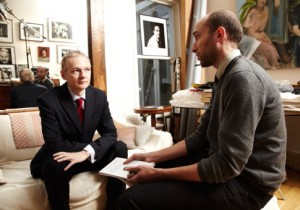Getting the WikiLeaks Story

Details
It took Forbes staff writer Andy Greenberg '04 more than two months of negotiations to nail down an interview with WikiLeaks founder Julian Assange. And less than a month after his December Forbes cover story reported that Assange was planning to release documents from a major U.S. bank, Greenberg had a book deal with a major publishing house.
“It was a huge rush,” recalls Greenberg, 29, who lives in Brooklyn with his wife, Malika Zouhali-Worrall, a filmmaker.“After the story was published, agents contacted me, and then it was a crazy, hectic thing to get the proposal done before Christmas.”
The book will look at the past and future of secret leaking, exploring how trends in cryptography, the Internet and the modern deluge of data have made institutional secrets harder than ever to keep in this age of technological and cultural change.
It was Greenberg's story on Assange, the onetime computer hacker whose WikiLeaks site has disclosed thousands of secret documents involving the wars in Afghanistan and Iraq, that attracted the book deal. But landing the Assange interview was a story in itself.
It took two months, and several intermediaries, as Assange moved underground from country to country to avoid sexual-assault charges in Sweden and possible detention elsewhere. After making contact with WikiLeaks operatives, Greenberg flew to Iceland to interview sources, then hung out there for several days, awaiting instructions, while enjoying a soak or two in the outdoor public baths.
Finally, he was told to meet Assange in London, with the proviso that the interview would go no longer than 45 minutes. But Greenberg and Assange hit it off, and two hours later, Greenberg had his biggest scoop ever: WikiLeaks was preparing a major dump of documents from a major U.S. bank.
“Assange's assistant pleaded with him to leave, but he ignored the aide,” says Greenberg.“It really seemed like he wanted to chew the fat.”
Greenberg, who grew up in Durham, N.C., came to Haverford in 2000, attracted by its reputation as a close-knit intellectual community with a liberal political bent. He embraced the liberal arts, majoring in philosophy and taking courses in East Asian studies, political science and music theory.
Though he didn't write for the student newspaper at Haverford, he thought journalism might be a career path—a way to write and be creative while keeping his feet planted firmly in the real world. He'd learned Mandarin at Middlebury College over two summers, and landed a fellowship through Haverford's Center for Peace and Global Citizenship to do translations for an environmental nonprofit group in Beijing. In his spare time, Greenberg launched his freelance career, writing for Time Out Beijing and the South China Morning Post.
Realizing he needed journalism training to make his professional leap, he enrolled in New York University's graduate journalism program. Haverford Philosophy Professor Kathleen Wright had suggested he contact one of her former students, Associate Professor Robert Boynton '85 at NYU's Arthur Carter Journalism Institute.
Boynton suggested Greenberg pursue business reporting, cognizant of the job prospects in that sector of the writing world. He later taught Greenberg in a course in magazine writing. “The business story is the story of America, and if a business writer, like Andy, has a large canvas in mind, you can write about most any topic,” says Boynton.
While at NYU, Greenberg landed an internship at Forbes, and six months before he was to graduate, was working full time at one of the nation's top business publications while finishing up his degree. He started writing about technology on the cutting-edge of American business and cultural life, taking a particular interest in cyber-security, with its bands of hackers—the“white hats” who attack a company's computer system on behalf of the company to find its vulnerabilities, and the“black hats” who do so without permission, and with malicious intent.
Now he'll be keeping up with his Forbes responsibilities, which include contributing five to 10 blog posts a week to Forbes.com and writing for the magazine, while working on the book. Writing the 400-word blog posts, he says, is like running sprints. The occasional 4,000-word magazine pieces are more like middle-distance races, while completing a 100,000-word book, he supposes, takes the stamina, and pacing, of a marathoner.
“I guess I'll be running a marathon while doing sprints and the 800-meters, all at the same time,” he says.“It's pretty terrifying.”
—David McKay Wilson



